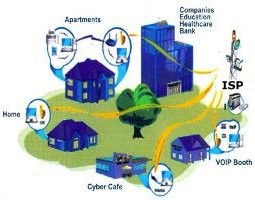Challenges Of Rising Internet Connectivity
 The beneficial effects to a nation’s economy of increased internet connectivity was discussed in my previous post. We must take note that while there are many benefits to having increased Internet connectivity, its rise also poses lots of challenges to its service providers and more especially to the government of a third-world country like the Philippines. At present, one of the biggest concerns is regarding the pressure on digital infrastructure specifically because of the fact that 85% of Internet Protocol version 4 (IPv4) addresses had been allocated and deploying the IPv6 solution will require a great deal of resources from both the government and the private sector.
The beneficial effects to a nation’s economy of increased internet connectivity was discussed in my previous post. We must take note that while there are many benefits to having increased Internet connectivity, its rise also poses lots of challenges to its service providers and more especially to the government of a third-world country like the Philippines. At present, one of the biggest concerns is regarding the pressure on digital infrastructure specifically because of the fact that 85% of Internet Protocol version 4 (IPv4) addresses had been allocated and deploying the IPv6 solution will require a great deal of resources from both the government and the private sector.
According to an article on socio-economic impact of growing Internet usage, the following are some of the challenges poised by rising connectivity:
- There is a global digital divide. A lack of Internet and IT skills in countries with poor cable and IT infrastructure will mean they are unable to compete with economies which have highly-skilled and IT literate work-forces. In developing countries, mobile phones have taken off quicker than computers owing to the lack of fixed-line networks in rural and difficult to reach areas, with wireless access enabling consumers to “leap-frog” fixed-line methods for Internet access;
- The rise in Internet usage has corresponded with growing concerns over privacy and data protection, while cyber attacks on businesses and governments remain a problem. Cyber security results in a lack of confidence in the Internet, while online fraud and identity theft leave consumers wary about online transactions;
- Internet usage in developing countries is reliant on changes to the regulatory framework, government expenditure on infrastructure, and open and competitive markets to reduce costs.
I would take note of the last one among the challenges of rising Internet connectivity because our government at present seems helpless on imposing rightful regulations on our Internet service providers (ISPs) which are 100% privately-owned. I have to be more specific and say that our current regulations on the use of Voice over Internet Protocol (VoIP) are very much tilted in favor of ISPs to the detriment of the public in general. I have tackled this issue in my past blogs and I plan to reverberate the issue so with the hope that our incoming administration would care to listen to small voices of i-café owners.




[…] Challenges Of Rising Internet Connectivity […]
[…] Challenges Of Rising Internet Connectivity […]